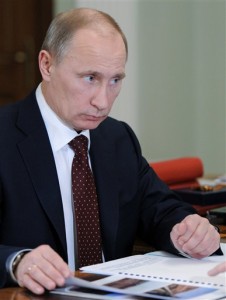Fitch cuts Russia outlook on anti-Putin protests

Prime Minister Vladimir Putin listens during a meeting in Novo-Ogaryovo residence outside Moscow on Monday, Jan. 16, 2012. Fitch downgraded Russia’s debt rating on Monday due to uncertainty over protests against Putin's planned return as president. AP PHOTO/RIA NOVOSTI, YANA LAPIKOVA, POOL
MOSCOW—Fitch on Monday cut the outlook on Russia’s debt rating due to uncertainty over protests against Vladimir Putin’s planned return as president and the growing risk of sustained capital flight.
“Political uncertainty in Russia has risen and the global economic outlook has worsened since Fitch last affirmed the rating in September 2011,” Fitch sovereign group director Charles Seville said.
The agency affirmed its BBB rating on Russia’s long-term debt but lowered the outlook to ‘Stable’ from ‘Positive’ as it noted “the limitations and risks associated with Russia’s political model.”
Russia’s largest protests in nearly two decades followed allegations of fraud in the December 4 election to the lower house of parliament in which the ruling party clung on to a narrow majority.
But their focus has increasingly turned to criticism of Putin himself as he campaigns for an historic third term as president in March 4 elections.
Fitch said there seemed little doubt that Putin – a known quantity to the markets who served two presidential terms between 2000 and 2008 – would still win the vote to return to the Kremlin after serving as prime minister.
It noted, however, that Putin appeared to have been caught off guard by the unrest and therefore was becoming more vulnerable.
“It is unclear how the country’s leadership will respond to the unexpected wave of protests triggered by the elections to the Duma on December 4 and to the broader shift in the political landscape.”
It added that “political uncertainty increases the risk of capital flight, which could put greater pressure on Central Bank of Russia reserves and the ruble.”
Russia’s net private sector capital outflows accelerated throughout 2011 to total $84.2 billion – the highest figure since the 2008 global financial crisis.
Putin, a former KGB agent, is widely recognized as Russia’s ultimate decision maker who has the final say on any major foreign investment deal even while serving as prime minister under his hand-picked presidential successor Dmitry Medvedev.
Economists note that capital outflows grew still further in December when it became clear that Putin might be forced to govern from a relative position of weakness for the first time in his political life.
Putin, meanwhile, unveiled a broad new economic election program on Monday in which he touted the growth achieved during his 12 years in power, promising to create 25 million new “high-tech and well-paying” jobs for the middle class.
He also underscored his more conservative reputation by dismissing those who promoted economic “breakthrough and revolution instead of sustainable development.”
Russia’s economy has benefited from tight controls that put its growing export revenues, mainly from oil and gas sales, in special rainy day funds, which helped the financial sector survive the 2008 global financial crisis.
Putin said growth reached 4.2 percent last year thanks to limited state borrowing and a healthy budget that contrasted sharply with the European Union’s sovereign debt struggles.
Fitch gave a cautious nod to Russia’s past successes while warning that Putin was now in a weaker position to carry out necessary reforms.
“A government under popular pressure may be less inclined to carry out a fiscal adjustment,” it said.
“Rapid growth in spending, averaging 17 percent in the four years to 2011, has widened the non-oil fiscal deficit, pushed up the fiscal break-even oil price to around $117 per barrel for 2012 and has increased vulnerability to an eventual fall in oil prices,” it warned.














